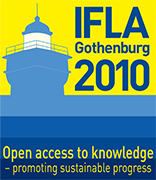Pour traductions voir le site du CFI
Call for Papers
Bibliography Section
Theme:
Open Access to National Bibliographies: Best Practices and Business Models
|
National bibliographies play a vital role in recording the published cultural heritage of their countries. The character of National Bibliographies has been changing as forms of information production change, e.g. digital publications, open access journals, web harvesting, archiving government websites and mass digitization.
While promoting free access to information, many national libraries still produce their own bibliographies as a product to be bought by their patrons. Libraries depend on the money earned in order to produce the expensive products. On the other hand, offering the national library records via open access enables a variety of further possibilities, such as a higher visibility, greater usage by other institutions, and thus a better leveraging of the work done in a national library.
In order to still be able to provide this kind of bibliographic service to the public in the future, new business models will be needed, i.e. models that meet the challenges of a changing information infrastructure.
- What kind of business models can be used to promote the best service? What kind of licences can be used? What criteria can be used to evaluate the strengths and weaknesses of "open access bibliographies"?
- For instance, do your business models include differentiated approaches to the following?
- commercial/non-commercial use
- the formats, in which you offer the bibliographic data (e.g. print, CD, web-catalogue, datasets in exchange formats, as linked data over the web etc.)
- service levels, such as free core services and prized value added services
- In this context, how do you redefine the scope of national bibliography? What kind of impact does the definition have on the selection, resource description, preservation and subject access of national bibliography?
- What ongoing projects are underway or planned to assist national bibliographies as they pass from traditional formats and processing to a system that allows them to work in a digital environment, for instance, as linked data over the web?
Submissions
All proposals must be in before 10 February 2010.
- The selection of papers will be based on the abstracts and authors will be notified whether they have been successful or not by 19 February 2010.
- Completed papers must be an original submission not published elsewhere. They will be due by 1 May 2010 to allow time for review and preparation of translations. The author(s) should indicate his/her personal full contact details and include a summary curriculum vitae with the paper.
- Papers should be no more than 20 typed pages in length and written in any of the IFLA official languages.
- In preparing the paper, please follow the IFLA recommendations and general guidelines.
- A maximum of 20 minutes will be allowed for a summary delivery of the paper during the Section's Open Programme in Gothenburg.
- Members of the Bibliography Standing Committee will work with authors to ensure a quality and timely paper.
- Selection
Full abstracts should be prepared following the template provided below. Each abstract will be blind-reviewed by members of the Bibliography Standing Committee. Abbreviated abstracts or late submissions will not be considered. - Purpose of the paper
What are the reason(s) for writing the paper (or the aims of the research)?
Design/methodology/approach: How are the objectives achieved? Include the main method(s) used for the study. What is the approach to the topic, and what is the theoretical or subject scope of the paper? - Findings
What was found in the course of the work? This will refer to analysis, discussion, or results. - Research limitations/implications (if applicable)
If research is reported on in the paper, this section must be completed and should include suggestions for future research and any identified limitations in the research process. Practical implications (if applicable): what outcomes and implications for practice, applications and consequences are identified? All papers should have practical applications. What changes to practice might be made as a result of this research/paper? - What is original/value of the paper
What is new in the paper? State the value of the paper and to whom.
Please submit a detailed abstract in English (at least 500 words) of the proposed paper that is consistent with the above suggested themes, and relevant author/s details via e-mail to:
Charlene Chou
Bibliography SC, session organizer
Organization/Employer
E-mail: cc179@columbia.edu
Anke Meyer
Bibliography SC, session organizer
Organization/Employer
E-mail: a.meyer@d-nb.de
After your submission
The selection of papers will be based on the abstracts and authors will be notified whether they have been successful or not by 19 February 2010.
Please note
Please note that the expenses of attending the Gothenburg conference (including travel, conference fee, and any other expenses) will be the responsibility of the author(s)/presenter(s) of accepted papers.
Last update: 9 February 2010
